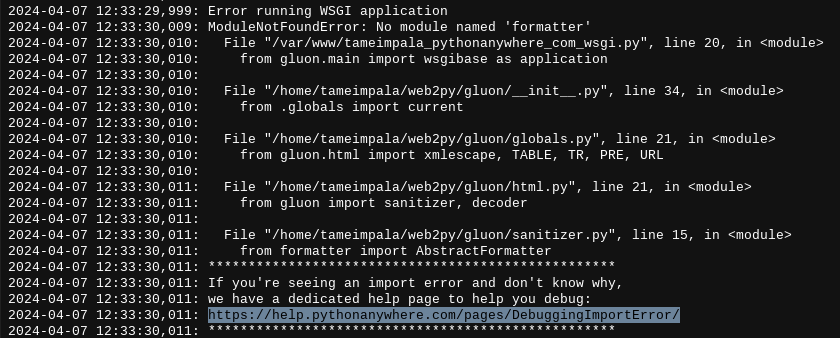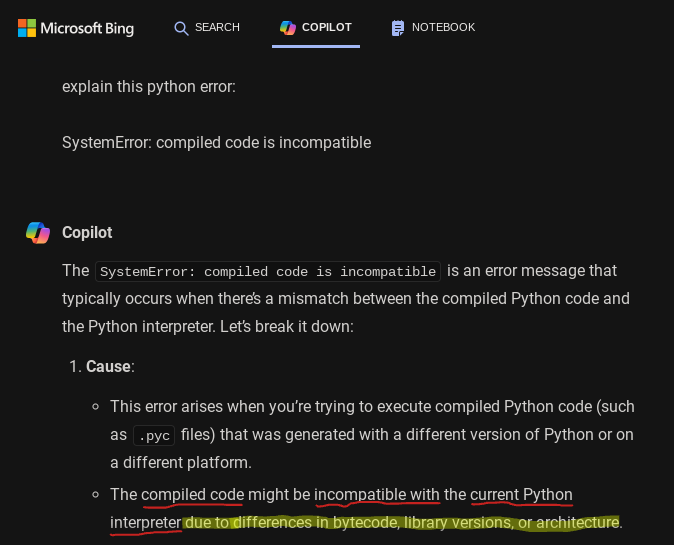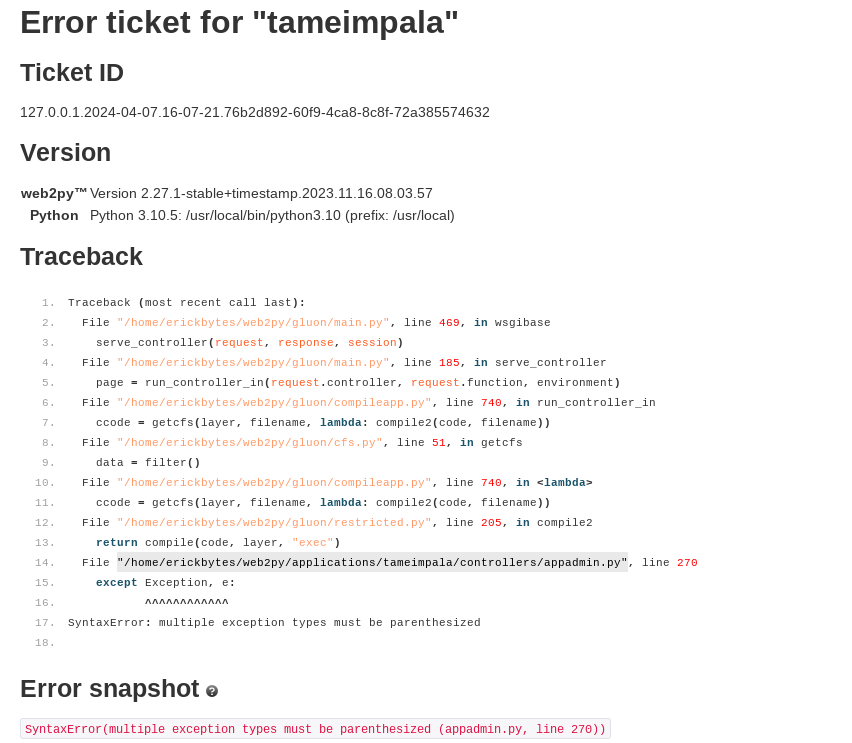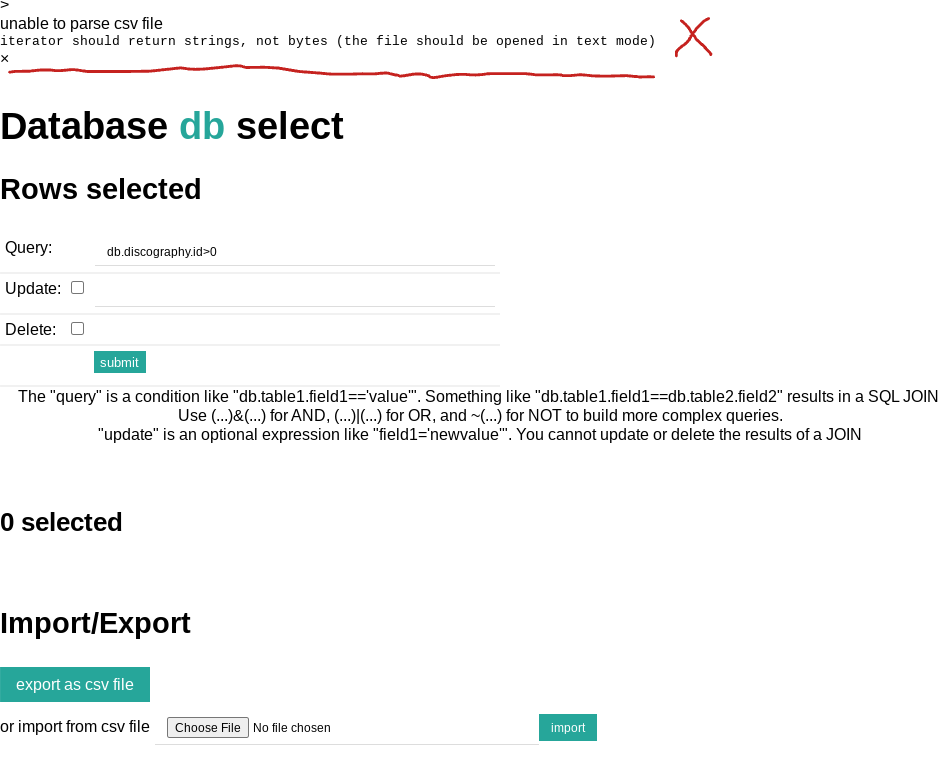Troubleshooting Tracebacks to Resurrect a Python Web2py App
Back in 2016, I built a web2py app as my first web application. It accepts a prompt from the user and primitively attempts to match that text to a line of Kevin Parker's lyrics written for the band Tame Impala.
I didn't look at the app's code for many years. I just needed to log into PythonAnywhere every 3 months and hit a button to keep it running on their free plan. Until I decided to update it recently.
Tame Impala released a new album and lots of additional tracks to import to the app. Just need to update the database with new music. No big deal, right?
Part of the problem with updating the app was that I didn't remember where the important code like the controller default.py and relevant HTML files were after not seeing it for 5+ years. It took some time to remember the folder structure of a web2py project. Since it was my first project ever, documentation was nonexistent. I could have saved myself a lot of grief if I'd wrote down some notes when I made the app.
web2py is relatively easy to grasp for Python developers. One thing I like is that once it is installed, the development server is easily started by running the web2py.py file:
cd web2py
python3.10 web2py.py
web2py Python Errors Solved
I installed web2py locally with the help of a DigitalOcean blog post. After I failed to push a new version of the app to production, for some reasons it was in a broken state. Python version issues surfaced, requiring some heady navigation. Enjoy these gritty details of the tracebacks that transpired.
ModuleNotFoundError: No module named 'formatter'

This error showed up in my app's WSGI error logs. Initially, I researched and attempted to install the formatter module. I believe this was caused by attempting to run Python code compiled to a .w2p file on Python 3.11 on a Python 3.10 interpreter. However, I didn't know how to solve it until after I saw the next error.
SystemError: compiled code is incompatible

After reading this error, I consulted Bing about it. One of the options that Bing suggested was that my Python code had incompatible versions. This was caused by a mismatch between my development and production Python versions.
Installing Python 3.10 in Development Environment
Originally, I compiled the updated web2py app in Python 3.11 on my Chromebook. My PythonAnywhere environment was running Python 3.10. Therefore, I need to build the development code in Python 3.10 to match the production environment on PythonAnywhere. I entered a handful of commands from Bing Copilot to build Python 3.10 on my Ubuntu development environment:
sudo apt-get install build-essential
sudo apt-get install zlib1g-dev
sudo apt-get install libsqlite3-dev
wget https://www.python.org/ftp/python/3.10.5/Python-3.10.5.tgz
tar zxvf Python-3.10.5.tgz
cd Python-3.10.5
./configure --enable-optimizations --enable-loadable-sqlite-extensions
make && sudo make install
The lesson I took away is to consider your production environment's Python version before you begin working on a project. In most cases, you'll want to match that version in your development environment to avoid errors like this.
After compiling the new development Python 3.10 version, I exported the app to a new .w2p file. Next, I imported the .w2p file containing the updated app to PythonAnywhere in the admin interface app importer.
After syncing my development and production environment versions, the app showed a different error. Progress!
Since I was using a .w2p file from 5+ years ago, it contained old Python web2py code written in earlier Python versions with a few more bugs. Despite these version inconveniences, I was happy to see the "compiled code is incompatible" and "formatter module missing" errors stopped. One problem solved, two more discovered in its wake, am I right?
SyntaxError: multiple exception types must be parenthesized

This error showed up in my appadmin.py. At some point this unparenthesized syntax was phased out of Python. The fix is add parentheses to the exception statements:
Incorrect
1 | except Exception, e: |
Correct
1 | except (Exception, e): |
unable to parse csv file: iterator should return strings, not bytes (the file should be opened in text mode)
In order to import the new Tame Impala songs to the SQLlite database, web2py provides a GUI interface in its admin panel or the DAL (Database Abstraction Layer). I chose to use the GUI. In the GUI, you can either manually enter each song or use its csv import widget. To save time, I imported via the csv widget. However, this error slowed me down. It stemmed from the need for TextIOWrapper to convert the csv data to a required format.

The solution I found was to use the fix suggested by AnooshaAviligonda. In web2py/gluon/packages/dal/pydal/objects.py, I swapped in this code:
1 | csv_reader = csv.reader(TextIOWrapper(utf8_data,encoding), dialect=dialect, **kwargs) |

After adding the above code to my web2py app's objects.py file, the csv importer completed my new Tame Impala songs database import. Also, I was able to export an app from my development environment and deploy it into PythonAnywhere via the admin interface. Mission accomplished.
I imported the new songs to my app and brought the code forward into future Python versions. Keeping up with this project over the years shows how maintaining an app across different Python versions can cause unexpected challenges. With these Python tracebacks conquered, the app is back on the web. Now with all of Tame Impala's new lyrics!
Check out my Tame Impala web2py app here: